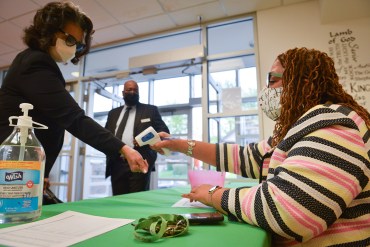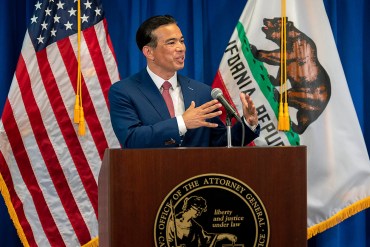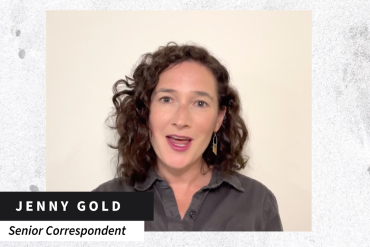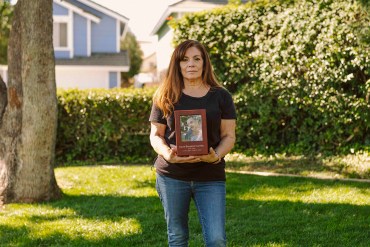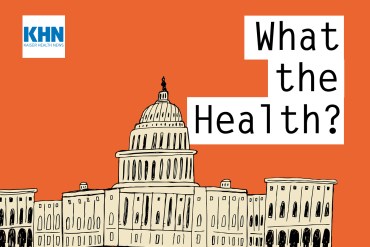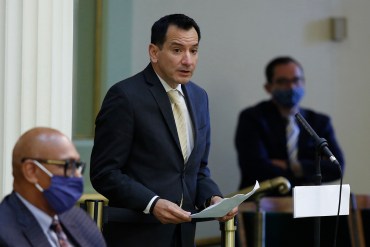Boeing Tested Air Purifiers Like Those Widely Used in Schools. It Decided Not to Use Them in Planes.
The technology that schools have been snapping up in the fight against covid “has not shown significant disinfection effectiveness” to install on its planes, Boeing found. Now the company’s study is being debated in a proposed class-action suit.
Trying to Avoid Racist Health Care, Black Women Seek Out Black Obstetricians
Besides shared culture and values, a Black physician can offer Black patients a sense of safety, validation and trust. By contrast, the impact of systemic racism can show up starkly in childbirth. Black women are three times as likely to die after giving birth as white women in the United States.
In Missouri and Other States, Flawed Data Makes It Hard to Track Vaccine Equity
Racial and ethnic categories for vaccination data vary widely from one state to another, complicating efforts to distribute shots where they are needed most. In Missouri, some red flags in the data surfaced, making health officials question its usefulness.
Analysis: Mounting Pressure on China About Covid ‘Lab Leak’ Could Backfire
Where the coronavirus originated remains a mystery and the Chinese are bucking demands to let investigators see more.
The ‘Grief Pandemic’ Will Torment Americans for Years
More than 5 million Americans lost a loved one to covid, and the ripple effects could lead to serious illness down the road.
Readers and Tweeters React to Racism, Inequities in Health Care
Kaiser Health News gives readers a chance to comment on a recent batch of stories.
From Racial Justice to Dirty Air, California’s New AG Plots a Progressive Health Care Agenda
In a candid interview, California’s newly appointed attorney general, Rob Bonta, reflects on his progressive roots and says he will pursue a health care agenda centered on the principle that quality medical care is a right, not a privilege.
Little-Known Illnesses Turning Up in Covid Long-Haulers
A significant number of post-covid patients suffer from syndromes that few doctors understand.
Behind The Byline: Finding a ‘Superstar’ to Interview
Check out KHN’s video series — Behind The Byline: How the Story Got Made. Come along as journalists and producers offer an insider’s view of health care coverage that does not quit.
Mississippi’s Black Communities Turned Around Their Covid Rates. Next Up: Make Strides on Vaccines.
Covid-19 tore through Mississippi’s Black population in the pandemic’s early days, but community efforts slowed the rate. Now health officials and community leaders aim to replicate the success as they dole out vaccines.
KHN Journalist Combs for Clues on Covid’s Origins
KHN and California Healthline staff made the rounds on national and local media this week to discuss their stories. Here’s a collection of their appearances.
Opioids Like ‘Lean’ Permeate Hip-Hop Culture, but Dangers Are Downplayed
In big cities and small towns, opioid use among some young hip-hop fans is about emulating their favorite rap star’s image — while paying little attention to the serious consequences.
In California, Nursing Home Owners Can Operate After They’re Denied a License
Nursing home chain ReNew Health continues to care for hundreds of patients even after the state attempted to crack down. Before and during the pandemic, homes connected to ReNew had safety violations.
KHN’s ‘What the Health?’: The Return of the Public Option
Lawmakers are working on fleshing out the concept of a “public option,” a government-run or heavily regulated insurance plan that would compete with private insurance. But the details are complicated, both substantively and politically. Meanwhile, bioethicists are debating whether the U.S. should be vaccinating low-risk adolescents against covid-19 while high-risk adults in other countries are still waiting. Margot Sanger-Katz of The New York Times, Alice Miranda Ollstein of Politico and Rachana Pradhan of KHN join KHN’s Julie Rovner to discuss these issues and more. Plus, for extra credit, the panelists recommend their favorite health policy stories of the week they think you should read, too.
Confronting Our ‘Frailties’: California’s Assembly Leader Reflects on a Year of Covid
California Assembly Speaker Anthony Rendon says covid exposed long-standing health care inequities that must be addressed. He told KHN he wants to get more people insured, boost broadband access so more patients can use telehealth and increase funding to local health departments.
‘Better Than the Hospital’: Pandemic Boosts Care for Serious Illnesses at Home
Covid-19 and dozens of other illnesses now qualify for home treatment under a new federal effort aimed at freeing up hospital beds during public health emergencies.
Lady Gaga and J.Lo Sell ‘Well’ Building Seal, But It’s a Payday, Not a PSA
A company sees the pandemic as an opportunity to push its ‘Well’ seal. It would like the indoor wellness logo to become as ubiquitous as the LEED green building halo — and make a profit, too.
Minneapolis Police Injured Protesters With Rubber Bullets. The City Has Taken Little Action.
A year after the murder of George Floyd in Minneapolis while in police custody, there is scant evidence the city has changed how its police officers use less-lethal weapons or strengthened its oversight. Instead, it may be a study in stymied reform, unenforced policies and a lack of transparency.
Corporations Encourage Employee Vaccination but Stop Short of Mandates
Public health officials fear that requiring jabs on the job would create a noisy, counterproductive backlash.
No-Cancel Culture: How Telehealth Is Making It Easier to Keep That Therapy Session
No-shows for behavioral health appointments have been a long-standing problem, with up to 60% skipped. Now telehealth, fueled by the pandemic, makes it easier for people dealing with depression and other mental health issues to make it to their appointments at a time when such care is in high demand. But teletherapy creates other challenges.






